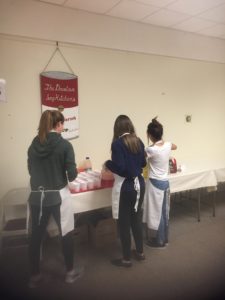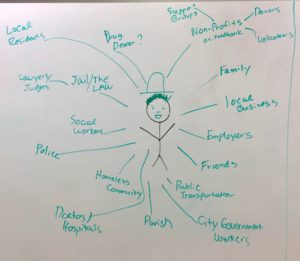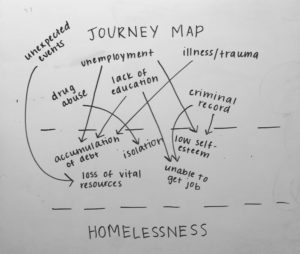On Wednesday, we had the opportunity to interview Rob Booker, the program manager at St. Joseph County Community Corrections. It was very powerful to hear the stories that he had to share, as well as the wealth of knowledge he has about the local homeless population. Mr. Booker saw substance abuse as the biggest perpetrator of homelessness today in South Bend.
Date: Feb 22, 2017
Location: Mendoza
User Characteristics:
- Approximately 40
- Male
- Program manager at the Ducomb Center in South Bend
- 15+ years of experience
Ducomb Center:
The Ducomb Center is a Community Corrections Facility in which people come as a sort of “last resort” before jail time. Its typical resident is a nonviolent first time offender, with moderate risk. Residents must pay $100-300 (or 30% of their salary) to live in the center, which also offers a work release program. The end result of a resident’s stay in the Ducomb Center is usually a house arrest sentence after they cooperatively serve a given amount of time. The length of stay can be anywhere from six weeks to two months.
What is this person’s biggest pain?
As a person in the community corrections field for almost his whole life, Mr. Booker is sad to see repeat offenders coming back to the center in a worse condition than they left the first time. He often sees a cyclical process in which residents keep getting readmitted until they hit rock bottom, and hopefully realize that they need a lifestyle change.
Main Takeaways:
- Substance abuse is the biggest perpetrator of homelessness
- Need adequate treatment and services sooner
- Need assistance with mental health issues
- Coming out of jail, prisoners are only given a month’s supply of medications
- After this, if they don’t have adequate healthcare they can no longer receive the drugs they need
- Ducomb Center needs a doctor or psychiatrist on standby to assist with these types of issues
- Residents typically don’t like staying in the center- their main goal is to get house arrest
- Help people BEFORE they reach homelessness



